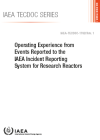To ensure that research reactors operate safely and efficiently, their operation must be based on strategic planning, sound management and adequate financing. The IAEA helps Member States optimize these elements by sharing of experiences, operational planning assistance, training programmes and peer reviews.
Operation and maintenance of research reactors
A high-quality operation and maintenance programme for research reactors depends on effective management; sound policies; exemplary procedures and practices; adequate resources; and capable personnel. The research reactor community faces a number of challenges in this area. One is the completion of safety assessments in light of the 2011 Fukushima-Daiichi accident, as well as the implementation of needed improvements in this field. Another is the fact that more than half of the world’s operating research reactors are over 40 years old and, while still valuable and utilized effectively, face various issues related to component and system aging.
The IAEA’s assistance to Member States includes international peer reviews, such as the Operation and Maintenance Assessment for Research Reactors (OMARR). OMARR missions are undertaken to give Member States advice and assistance to improve their operational and maintenance practices. The Agency also helps develop and implement operational and maintenance plans, ageing management plans and training programmes.
To address the ageing of research reactors, the IAEA runs ageing management programmes that include routine inspections, periodic testing of reactor components and corrective or preventive maintenance steps, for instance by installing inspection equipment.








